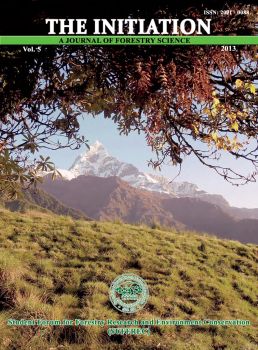Green Economy for Sustainable Development in Nepal: Role of Forestry Sector
DOI:
https://doi.org/10.3126/init.v5i0.10259Keywords:
Green economy, Community-based forest management, Green jobs, Green infrastructure, Community-based enterprisesAbstract
Although there is no unified view among the policy makers and development experts on what represents and drives a Green Economy and there is also no clarity on what it means for the mountain countries like Nepal, the concept is however, very pertinent in the context of rapid climate change and unsustainable development. There is a general agreement that green economy provides opportunities for developing and forest rich country like Nepal as the fossil fuel-based and import oriented consumerism based economy cannot be successful today and in future. It is likely that green economy could be a good vehicle to reach sustainable mountain development (SMD). However, there is a need to develop specific and strategies and action plans to implement green and low-carbon economic activities. First and foremost, there is a need to develop a national policy and to use green economy to achieve poverty reduction and sustainable development. The economic growth rate has to be sustained while reducing poverty through sound development plans and programmes actively participated and managed by poor and enterprising rural and urban communities and supported by government, non-government and donor agencies. There are numerous challenges in adapting and adopting Green Economy policies in a poor country like Nepal. Capacity and skill development, technology adaptation, transfer, and retrofitting to suit Nepal’s hilly and mountainous terrains, need for huge investment in processing and value addition, and of course adapting to and mitigating against climate change are some of the major challenges. Notwithstanding these constraints, green economic policies and programmes can be means to achieve sustainable development in the mountainous region. There is need to document good case studies for drawing lessons so that future green growth pathway can be charted in a flawless manner and scaling up of the success to create bigger impacts can be achieved. Finally, effective and outcome oriented implementation will require multi-disciplinary planning, interdisciplinary implementation, and effective and participatory monitoring and evaluation.
DOI: http://dx.doi.org/10.3126/init.v5i0.10259
The Initiation 2013 Vol.5; 96-109

